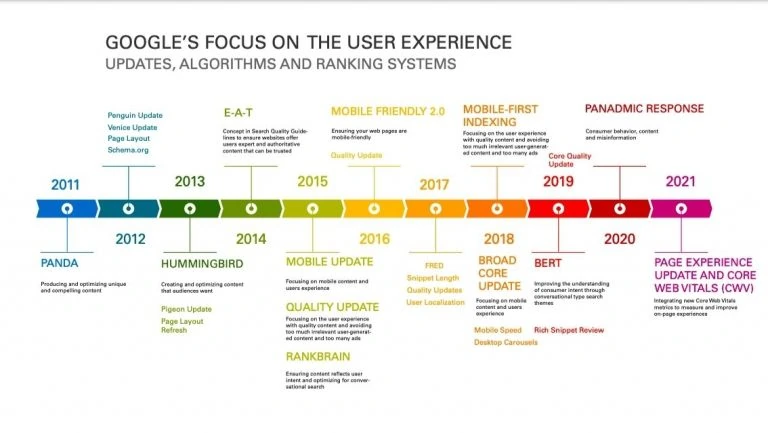
SEO is the most viable and cost-effective way to both understand and reach customers in key moments that matter.
Many brands and businesses know (or think they know) that they need SEO for their digital properties, and the benefits they will get from the SEO work being implemented on their behalf.
SEO will certainly improve a website’s overall searchability and visibility, but what other real value does it offer? Why SEO is growing in importance the way it is?
These 11 reasons should offer some clarity, regardless of the industry or business size, as to why businesses need SEO to take their brand to the next level.
1. Organic Search is Most Often the Primary Source of Website Traffic
Organic search is a massive part of most businesses’ website performance and a critical component of the buyer funnel and ultimately getting users to complete a conversion or engagement.
As marketers know, Google owns a significantly larger portion of the search engine market than competitors like Yahoo, Bing, Baidu, Yandex, DuckDuckGo, and many others.
That’s not to say that all search engines don’t contribute to a brand’s visibility – they do. It’s just that Google owns a considerable portion of the overall search market.
Nevertheless, it’s a clear-cut leader, and thus its guidelines are important to follow.
But the remaining part of the market owned by other engines is valuable to brands, too. This is especially true for brands in niche verticals where voice, vertical and visual search engines play an essential role.
Google, being the most visited website in the world, also happens to be the most popular email provider globally with more than 1 billion users.
YouTube is the second biggest search engine and over 2 billion people access it at least once a month.
We know that a clear majority of the world with access to the internet is visiting Google at least once a day to get information.
Being highly visible as a trusted resource by Google and other search engines will always work in a business’s favor. Quality SEO and a high quality website take businesses there.
2. SEO Builds Trust & Credibility
The goal of any experienced SEO is to establish a strong foundation for a beautiful website with a clean, effective user experience that is easily discoverable in search, thanks to the trust and credibility of the brand and its digital properties.
Many elements go into establishing authority regarding search engines like Google.
In addition to the factors mentioned above, authority is accrued over time as a result of aspects like:
- Natural links
- Positive user behaviour
- Machine learning signals
- Optimized on-page elements & content
But establishing that authority will do more for a brand than most, if not all, other digital optimizations.
The problem is, it’s impossible to build trust and credibility overnight – just like in real life. Authority is earned and built over time.
Following Google’s EAT guidelines is critical to ensure successful results.
Establishing a brand as an authority takes patience, effort, and commitment and relies on offering a valuable, quality product or service that allows customers to trust a brand.
3. SEO is the Best Way to Understand the Voice of the Consumer
From understanding macro market shifts to understanding consumer intent in granular detail, SEO tells us what customers want and need.
SEO data and formats – spoken or word – gives us clear signals of intent and user behavior.
It does this in many ways:
- Search query data
- SERP analysis
- Analytics data and AI insights
4. Good SEO Also Means a Better User Experience
User experience has become every marketer’s number one priority. Everyone wants better organic rankings and maximum visibility. However, few realize that optimal user experience is bag part of getting there.
Google has learned how to interpret a good or unfavorable user experience, and a positive user experience has become a pivotal element to a website’s success.

Customers know what they want. If they can’t find it, there’s going to be a problem. And performance will suffer.
A clear example of building a solid user experience is how Google has become more and more of an answer engine offering the sought-after data directly on the SERPs (search engine results pages).
The intention is to offer users the information they are looking for in fewer clicks, quickly and easily.
Quality SEO incorporates a positive user experience, leveraging it to work in a business’s favor.
5. Local SEO Means Increased Engagement, Traffic & Conversions
With the rise and growing domination of mobile traffic, local search has become a fundamental part of small- and medium-sized businesses’ success.
Local SEO aims at optimizing your digital properties for a specific location so people can find you quickly and easily, putting them one step closer to a transaction.
Local optimizations focus on specific neighborhoods, towns, cities, regions, and even states to establish a viable medium for a brand’s messaging on a local level.
6. SEO is Relatively Cheap and Very Cost-Effective
Sure, it costs money. But all the best things do, right?
SEO is relatively inexpensive in the grand scheme of things, and the payoff will most likely be considerable in terms of a brand’s benefit to the bottom line.
This isn’t a marketing cost; this is an actual business investment.
Exemplary SEO implementation will hold water for years to come. And, like most things in life, it will only be better with the more attention (and investment) it gets.
7. SEO Brings New Opportunities to Light
High-quality SEO will always find a means of discovering and leveraging new opportunities for brands not just to be discovered but to shine.
Offering quality SEO to brands means submersing an SEO team in everything that is that brand. It’s the only way to truly market a brand with the passion and understanding that its stakeholders have for it: becoming a stakeholder.
The better a brand is understood, the more opportunities will arise to help it thrive. The same can be said about SEO.
New opportunities with SEO today can come in many ways – from giving content, digital and social opportunities to helping with sales, product, and customer service strategies.
Conclusion
The role of SEO has expanded significantly over the last few years.
In particular, SEO helps consumers when in need, and implementing robust, quality SEO on a brand’s website and digital properties will benefit brands and their marketing efforts.
SEO has its challenges, but the opportunities it brings help future-proof success for any type of business and are critical to a brand’s web presence now and in the future.
